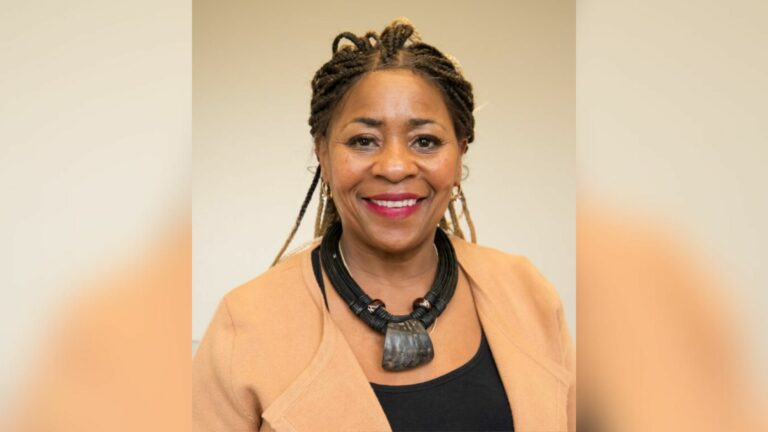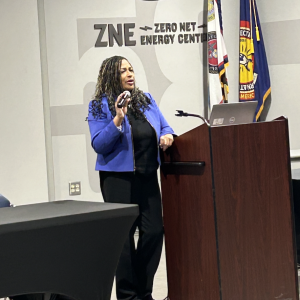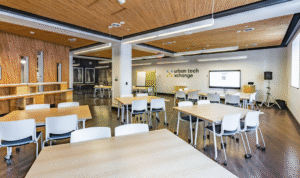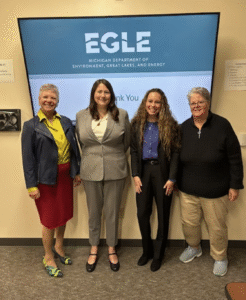
- Kim Kisner
- Business
- 08/27/2024
CEO Donele Wilkins Discusses Advancing Green-Collar Jobs and Her Role with White House Advisory Council

Founded in 2010 by native Detroiter Donele Wilkins, the Green Door Initiative is a Detroit-based nonprofit dedicated to advancing sustainability and environmental stewardship. It emphasizes developing green spaces, revitalizing urban areas, empowering communities, and workforce development tailored to the green energy sector.
In March, Wilkins was appointed to serve on the White House Environmental Justice Advisory Council established by President Biden under Executive Order 14008 of January 27, 2021, to tackle the climate crisis here and around the world.
SBN Detroit interviewed Wilkins about the vision and the progression of the Green Door Initiative and how serving on the advisory council will impact its trajectory.
Q: What is the impetus behind the Green Door Initiative?
A: The Green Door Initiative is an environmental justice nonprofit organization based in Detroit. Our mission is to ensure that everyone, regardless of race or ZIP code, is environmentally literate and capable of promoting and living a sustainable lifestyle.
We achieve this through several programs and initiatives.
First, we offer community education and access to resources – opportunities for residents and community members to learn about environmental protection and improve their daily lives. Through workshops and awareness programs, we translate complex information into actionable steps, helping individuals access resources to enhance their environmental conditions.
Another big focus of ours is workforce development. Here, we focus on increasing the capacity of residents to compete in the environmental and green sectors. Our 12-week training program has a 92% job placement rate, offering underrepresented and underserved individuals opportunities to become certified and licensed for well-paying, family-supporting jobs. This program covers various environmental and green-collar jobs, addressing climate change, pollution removal, and more.
We also engage youth in this program. Every summer, we employ high school students to support their transition into leadership roles and career planning.
And finally, we work to impact public policy related to environmental health, advocating for equal protection to mitigate issues such as poor air quality, and unsafe drinking water. We advocate for investments and resources that mitigate climate impacts, ensuring that our communities are heard in decision-making processes and receive the necessary support.
Q: What types of jobs does your workforce development program help people secure?
A: We train individuals for diverse careers in the environmental and green sectors. We specialize in placing certified professionals in roles related to environmental cleanup, including handling hazardous materials and addressing pollution.
We also support job placement in energy audits and solar installation, helping individuals improve energy efficiency and contribute to renewable energy projects. Additionally, we facilitate apprenticeships, particularly in electrical fields linked to green energy.
Our network extends to disaster response roles, where individuals assist with emergency food and water distribution, and to various general green sector positions. We continuously seek out potential career opportunities in the environmental field.
Q: What other initiatives are you pursuing in workforce development?
A: We’re actively involved in several projects related to workforce development. One major initiative is our Air Quality Management Project, which we started with funding from the EPA. This involves installing air monitoring systems and collecting real-time data to share with the community. We are also focused on community outreach, training residents on the significance and use of this data.
Additionally, we’ve created job opportunities through our training programs. Several participants have been hired for internships and full-time positions as air monitor installers.
We’ve also partnered with Just Air, a for-profit company, to fulfill a contract with Wayne County for installing 100 air monitors. This collaboration allowed us to employ our trainees and demonstrate our capability to meet local needs.
Q: What is the economic impact of green jobs?
A: It’s huge. These roles are among the fastest-growing job trends that exist today, and they significantly benefit local economies. Green jobs contribute to environmental restoration and adaptation, aiding communities in recovering from storms and other environmental challenges.
As the shift toward electric vehicles and related infrastructure accelerates, more job opportunities arise, creating synergy with the auto industry.
Our 12-week program trains several cohorts of 25-30 individuals quarterly, offering comprehensive education in environmental and green-collar sectors. This training spans various fields, including solar installation, and prepares participants for diverse opportunities, benefiting both large and small contractors. To date, we’ve graduated 1,700 individuals from our program.
Q: Does Green Door focus on manufacturing jobs, given the industry’s significance in Detroit?
A: Yes, we do engage with manufacturing jobs, including those related to solar panel assembly. For example, we’ve partnered with companies involved in solar panel manufacturing and installation.
We’ve also established a company – 313 Solar – that is not yet launched, which will aim to handle the full spectrum of solar panel operations, from manufacturing to maintenance.
We’re actively collaborating with companies planning to set up in Wayne County and working with the Department of Economic Development and other partners. These companies often seek grants and will recruit from our trained workforce, ensuring alignment with industry needs and sustainability goals.
Q: Can you expand on the community education you offer and its impact on Southeast Michigan?
A: We’ve provided approximately 25,000 hours of community awareness training. Our focus includes educating people on navigating permit hearings and understanding environmental protection at local, state, and federal levels. We cover environmental health impacts, such as the effects of poor air quality on health.
We also address misconceptions, such as victims being blamed for their health issues due to lifestyle choices like poor diet or smoking. We engage in discussions about food deserts and other systemic issues, aiming to shift the trajectory by proactively influencing development and policy changes.
Q: What impact do you have on local businesses?
A: We help local businesses access talent they might not have considered. Many companies struggle to fill positions or find the right skill set, and we provide solutions by presenting qualified candidates. Businesses are often surprised by the high quality of the individuals we connect them with.
We encourage businesses to reach out and have a conversation with us. Our team of job developers can collaborate with businesses to meet their talent needs and increase their capacity. If you’re looking for skilled individuals, Green Door is here to help.
Q: You were recently invited to serve on the White House Environmental Justice Advisory Council (WHEJAC). What does this opportunity mean to you, and what role will you play?
A: Being invited to the WHEJAC is an invaluable opportunity for me to represent my community and contribute to strategies that address environmental impacts and promote positive change. It allows me to bring an urban perspective to the table and help shape policies that can remove environmental burdens and create opportunities for meaningful progress.
Although I’m new to this role, my goal is to understand how to effectively contribute and improve the initiatives we’re working on.
Q: How do you think this appointment might impact Green Door Detroit?
A: I think this appointment is a significant opportunity for Green Door Detroit. The current administration has introduced resources like the Inflation Reduction Act and Justice 40, which can lead to substantial investments in environmental justice. Our increased visibility will bring more attention to our organization and community, potentially attracting the resources and support necessary to drive impactful change in Detroit.
Be sure to subscribe to our newsletter for regular updates on sustainable business practices in and around Detroit.
Kim Kisner
- All
- Business
- Community
- Education
- Events

Citizen Robotics is a Detroit-based nonprofit that advances the use of robotics and digital manufacturing in residential construction, focusing on improving productivity, sustainability, and long-term affordability. Best known for its early work in 3D-printed housing, it explores how alternative construction methods and new financial models can reduce material waste, lower lifetime operating costs, and enhance the resilience of homes. SBN Detroit interviewed Tom Woodman, founder and president of...

Detroit-based OneSix Energy is a clean-energy technology company focused on advancing a lower-carbon approach to hydrogen production. Headquartered at Newlab in Detroit, the startup is developing a proprietary methane pyrolysis system designed to produce hydrogen without carbon dioxide emissions, while also generating solid carbon as a co-product. SBN Detroit interviewed with cofounder Stefan Sysko about the company’s origins, its approach to hydrogen production, and why Detroit is positioned...

Regina Strong serves as Michigan’s first Environmental Justice Public Advocate, leading the state’s Office of the Environmental Justice Public Advocate. Her role focuses on addressing environmental justice concerns raised by communities, helping residents navigate environmental systems, and working across state agencies to improve equity in environmental decision-making. SBN Detroit interviewed Strong about the challenges communities are facing across Michigan and what environmental justice work looks like in practice....







